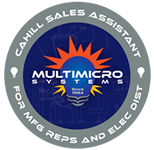An agency management system, or AMS, is a SaaS (software as a service) technology that insurance agencies use to organize their book of business and more effectively run their operations. Often, an AMS is specific to a niche of insurance, like P&C, life insurance, health and benefits agencies, or Medicare. Agency Management Systems are pieces of software that function as an automation system for an agency at every level. AMS can be customized to function as a system for either life and health insurance agencies or casualty and property-based agencies. If you’ve never heard of an AMS, you might be missing out on a major tool you could use to expand and streamline your agency business.
The Cahill System, Sales Assistant or SAW are all commons names for our Sales Management Software and Agency Management System. It provides an efficient way to estimate and manage your lighting, electrical and construction quotes. With the help of Sales Assistant software, users can quickly calculate exact costs for lighting projects and manage their electrical quote documents. This system gives you the ability to create, edit, and delete quotes without any paperwork, so you can easily track your project’s progress and keep everything organized. An Agency Management System is a comprehensive, incorporated multi-functional software that can help automate multiple work processes performed by an insurance agency on several different levels. An Agency Management System does not only operate as software that can track existing customers and bolster customer relations. It can also help to generate new client leads, and it can perform logistics analysis on individual insurance brokers. Agency Management Systems are useful for moderately-sized agencies that need to wear a bunch of different hats simultaneously with minimal staff as they grow. They’re also a good choice for larger insurance agencies that need workflow automation to help keep up with the large amount of data that the agency has to process in its day-to-day activities.
Agency Management Systems Are Software as a Service
An Agency Management System is known as a type of software called Software as a Service (SaaS). The objective of these automated software systems is to use cloud-based artificial intelligence to manage an agency’s data while also using their database to generate new leads using a broadband connection. Unlike other software licensing models, where the software license is sold to the buyer and the buyer downloads the software for singular use on their systems, SaaS systems are a delivery model where buyers subscribe to the software service and pay for it on a month-by-month or yearly basis. While SaaS systems have only begun to really gain steam over the past ten years due to the advent of cloud computing, these applications have been around in their primitive form since the 1960s.
How Do Agency Management Systems Work?

Agency management systems are software systems designed to take a lot of the grunt work out of the day-to-day clerical tasks involved with running an insurance agency. When agents have to perform this petty clerical and research work themselves, thousands of work hours are lost that could otherwise be utilized in proactively improving the company.
The foundation of both CRM (Customer Relationship Management) software and AMS (Agency Management System) software lies in their remarkable capacity to efficiently gather and analyze extensive digital data within minimal timeframes. This robust capability empowers agencies to seamlessly perform a multitude of tasks, ranging from comprehensive customer engagement analysis to intricate policy and workflow management. The streamlined data processing afforded by these systems not only enhances operational efficiency but also facilitates informed decision-making, enabling agencies to navigate complex landscapes with agility and precision. In essence, the advanced data-handling capabilities of CRM and AMS software redefine the landscape of modern agency operations. This ability allows agencies to easily conduct the following tasks:
Generate Sales Leads: Running a successful insurance company isn’t just about keeping existing customers happy. An agency needs to expand with new clientele to remain relevant and profitable. AMS software allows an insurance agent to track a potential client from their first contact to the point that they sign a contract.
Organize Book of Business: By quickly drawing on a large database of data to aggregate customer information, AMS software can keep an agency’s book of business easily organized according to individual contracts. One of the challenges of running an agency is having to keep vast amounts of data easy to access.
Targeted Marketing: Data mining customers through an agency management system allows an insurance agency to market specifically to individual consumers based on their needs and habits. Learning how an agency’s market behaves also allows them to make proactive decisions on how to offer new goods and services.
Because AMS software depends on AI data analysis to predict market trends and manage current clientele, it becomes more and more efficient the more data it accumulates through use. For this reason, AMS systems only become more valuable to an agency’s operations the longer they’re put in place. Another way that AMS software improves the general efficiency of an agency is through familiarity. The longer an agency is allowed to work within the structures laid out by an AMS program, the more productive and proficient each agent should become within the system as they become comfortable with using it.
Agency Management Systems vs. CRM Systems
Agency Management Systems (AMS) and Customer Relationship Management (CRM) systems serve distinct purposes, but they both play crucial roles in managing business operations, especially in industries like insurance, real estate, and other service-oriented sectors. Here’s a breakdown of their primary functions and differences:
Agency Management System (AMS)
Focus on Operations
– AMS is designed to streamline and automate the internal operations of an agency or business. It often includes features like policy management, claims processing, commission tracking, and accounting.
Policy and Workflow Management
– Manages the entire lifecycle of policies, from creation to renewal. AMS helps in tracking policy details, managing underwriting processes, and ensuring compliance with industry regulations.
Internal Collaboration
– Facilitates communication and collaboration within the organization. It may include tools for team collaboration, document management, and task assignment.
Commission Tracking
– Monitors commissions and compensations for agents based on their sales and performance. This feature is particularly important in industries like insurance.
Reporting and Analytics
– Generates reports and analytics related to the agency’s performance, allowing management to make informed decisions.
Customer Relationship Management (CRM) System:
Focus on External Relationships
– CRM systems are primarily concerned with managing and improving interactions with customers and leads. It focuses on building and maintaining relationships.
Lead and Contact Management
– Tracks and manages leads and contacts throughout the sales process. It helps in understanding customer needs and preferences.
Sales and Marketing Automation
– Supports sales and marketing efforts by automating tasks such as lead nurturing, email campaigns, and follow-ups. It helps in converting leads into customers.
Customer Support
– Manages customer support by tracking issues, providing a knowledge base, and ensuring timely resolution of problems.
Integration with External Tools
– Often integrates with external tools and platforms to gather data about customer behavior, preferences, and market trends.
AMS software may encompass many different types of automated workflows and processes, but all of them are organized with the management of an insurance agency in mind. This makes them a more effective tool for agencies than more generalized CRM systems. The Sales Assistant software by Multimicro Systems started out in 1984 with the objective of providing software that is easy to use, meets the needs of your business, provides the best value for your dollar, and is backed by superior support.
Advantages of Using Multimicro System Agency Management System/Software AMS?
Multimicro system is the preferred choice for over 1,000 clients and 3,000 users worldwide, dedicated to assisting manufacturer’s reps and agents in building successful businesses. Since our inception in 1984, we have emerged as the foremost provider of quality software in the lighting and electrical industry. The multimicro systems assistant rep system, also known as the cahill system, is supported by a seasoned team of professionals committed to enhancing your sales organization’s effectiveness. With each team member boasting over a decade of experience in the lighting industry, we deliver a product and service tailored to your specific needs, ensuring your success in the competitive landscape.
It’s complete. It’s comprehensive. It’s customer-oriented.
Featuring the most comprehensive and feature-rich software system for lighting and electrical manufacturers, multimicro partners with you to provide:
» Great Value and Lower Prices
» Original Industry-specific Software Developed In-house By Industry Experts
» Complementary Web-based Training; Install And Data Conversion
» Superior Customer Service & No Interest Payment Terms
» Money Back Guarantee
How Much Does an Agency Management System Cost?
The cost of an Agency Management System (AMS) varies based on factors such as the size of the agency, required features, and the chosen vendor. Typically, AMS solutions involve upfront implementation fees, ongoing subscription costs, and possible customization charges. Small to medium-sized agencies may find Cloud Based Solutions more cost-effective, while larger agencies might opt for on-premises solutions. Prices can range from a few hundred to several thousand dollars per month. It’s essential to consider the long-term benefits, efficiency gains, and support services offered by the AMS provider when evaluating the overall cost and selecting a system tailored to the agency’s needs. In conclusion, the Agency Management System (AMS) stands as a cornerstone in the modernization of agency operations, offering a comprehensive solution for efficiency and automation. Its role in centralizing data, automating tasks, and streamlining processes contributes significantly to improved productivity and reduced operational costs. AMS not only enhances internal workflows but also fosters better customer service through prompt responses and accurate information management. As agencies navigate the complexities of their industries, investing in an AMS proves instrumental in staying competitive, adapting to changing landscapes, and ultimately achieving sustainable growth. In embracing the capabilities of AMS, agencies position themselves at the forefront of innovation and effectiveness in the dynamic business environment.
